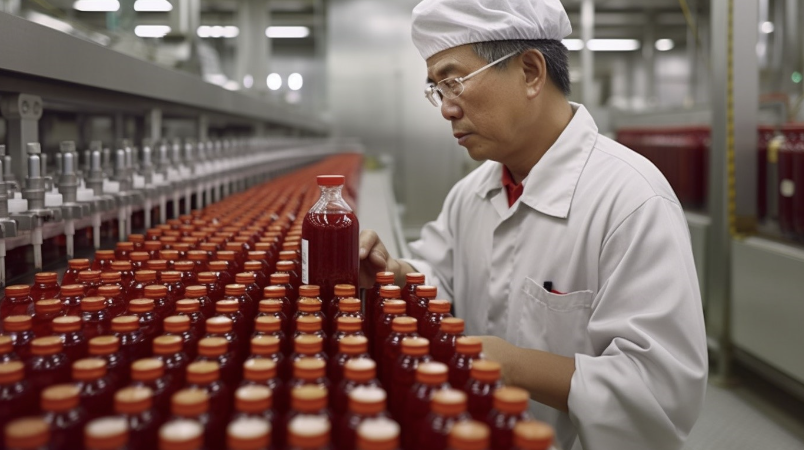
Understanding Market Dynamics in Asia
Asia’s diverse culinary landscape demands versatility from sauce manufacturers. Regional preferences vary widely, necessitating a flexible approach to production. Economic factors and shifting consumer trends, like the rising demand for organic or low-sugar sauces, further complicate the market landscape. Rapidly adapting to these changes is key for plant managers aiming to maintain market relevance and profitability.
The Role of Technology in Adaptation
Technological advancements, particularly in weigh filling machines for sauces, are vital in addressing these market shifts. Weigh filling machines offer precision and consistency in sauce packaging, a crucial factor in maintaining product quality. These machines are adept at handling a variety of sauce viscosities and compositions, ensuring accurate filling by weight, which is essential for meeting stringent quality standards. The flexibility offered by these machines allows for quick adjustments to accommodate different sauce types, a necessity in a market characterized by rapidly changing preferences.
Streamlining Production Processes
Efficiency in sauce production extends beyond the filling process. Plant managers must look at the entire production line, seeking opportunities to optimize and reduce waste. The implementation of weigh filling machines plays a significant role in this optimization. By ensuring precise filling, these machines minimize product wastage, a key factor in cost-effective production. Additionally, modular production equipment that can adapt to different bottle sizes and shapes is crucial for a responsive production line.
Case Studies: Success Stories from the Field
Consider a case from South Korea, where a popular Gochujang (red chili paste) manufacturer faced fluctuating demands. By integrating a state-of-the-art weigh filling machine, they managed to increase their production efficiency, adapt to varying demand spikes, and reduce waste significantly. Another example is a soy sauce manufacturer in China who adopted automated weigh filling systems, leading to a 30% increase in production speed and a notable improvement in packaging accuracy.
Future-Proofing Production: Long-term Strategies
For plant managers, staying ahead involves not just adapting to current trends but also anticipating future market shifts. Keeping abreast of advancements in weigh filling technology and other production innovations is crucial. Developing a scalable and flexible production process, where modern technologies like weigh filling machines can be integrated seamlessly, positions a plant well for future market changes.
Enhancing Quality Control with Weigh Filling Machines
Quality control is a paramount concern in sauce production. Weigh filling machines ensure that each bottle or packet of sauce meets strict weight specifications, a key aspect of quality control. This precision is particularly important when catering to markets with stringent consumer protection laws. Automated check-weighing systems integrated with filling machines can further streamline quality checks, ensuring consistency across batches.
Training and Skill Development for Optimal Machine Utilization
The efficiency of weigh filling machines is not just about the technology itself but also how well it is utilized. Training plant personnel in the operation and maintenance of these machines is crucial. This not only maximizes the machines’ efficiency but also extends their operational lifespan. Regular training sessions on the latest technological advancements keep the team updated and ready to tackle new challenges.
Sustainability and Environmental Responsibility
In today’s environmentally conscious market, sustainability is a key consideration. Weigh filling machines contribute to this aspect by reducing material wastage. Moreover, plant managers can take additional steps such as optimizing energy consumption of these machines and using sustainable packaging materials. Such measures not only cater to the eco-conscious consumer but also align with global environmental standards, enhancing the brand’s reputation.
Leveraging Data Analytics for Strategic Decisions
Modern weigh filling machines often come equipped with data analytics capabilities. By analyzing production data, plant managers can gain insights into efficiency bottlenecks, predict maintenance needs, and better understand production trends. This data-driven approach enables strategic decision-making, helping plants stay agile and responsive to market changes.
In the competitive and rapidly changing sauce market of Asia, the role of weigh filling machines in adapting production processes cannot be overstated. These machines offer precision, efficiency, and flexibility, key elements in meeting diverse market demands. By integrating advanced weigh filling technology, focusing on quality control, and emphasizing sustainability, plant managers can not only meet current market needs but also position themselves favorably for future challenges. The future of sauce production in Asia hinges on embracing technological advancements and staying adaptable in the face of market fluctuations.
For more information about our machines and our know-how, please contact us.



